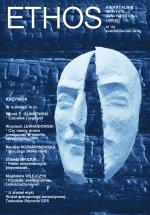 zobacz powiększenie | DOI 10.12887/31-2018-2-122-19 Agnieszka LEKKA-KOWALIK – The Experience of the Binding Power of Truth: A Methodologically Valid Point of Departure for Building Normative Ethics as a Scholarly Discipline Cena brutto: 7,00 PLN za szt. |
|
The paper analyzes Tadeusz Styczeń’s conception of ethics as both an empirical and a normative scholarly discipline. The empirical character of ethics is secured by the experience of the binding power of truth, and the binding power of truth is the source of the normative character of ethics. The starting point for developing this conception is the problem of inferring ‘ought’ propositions from ‘is’ propositions. Styczeń agrees with David Hume that there is no valid logical inference between the two kinds of propositions; yet he claims that this fact does not constitute a problem for ethics, for what matters for ethics is not logical connections between propositions but the experience which grasps factual and necessary connections between ‘is’ and ‘ought’ aspects of beings. An instance of this kind of experience is that of the binding power of truth, expressed by means of the following statement: “I must not deny what I have recognized as true.” The experience in question is significant both for ethics and anthropology, as it provides information about a particular state of affairs (and about the cognitive subject being the source of this information), as well as it generates the imperative for the cognitive subject to affirm and love truth for its own sake. Thus ethics turns out to be normative anthropology. The analysis of Styczeń’s conception leads to the conclusion that, so understood, ethics fulfills the basic methodological and epistemic requirements for a scholarly discipline. Therefore it holds true that normativity does not preclude the scholarly character of ethics. Yet the experience of the binding power of truth is theoretically laden at least in the following sense: it is grasped in a certain language and it assumes some background knowledge (for example, a knowledge of the existence of the human nature or that of the essential rationality of the human being). However, such assumptions are not a problem for ethics, as it shares this feature with other empirical disciplines, for instance physics. As it is demonstrated in the paper, while it is possible to build ethics on experience, justification of its theses ultimately involves a reference to metaphysics—and this is why removing normative ethics (both ethics as such and applied ethics) from the edifice of philosophy would be a misguided move. Keywords: normativity of ethics, the binding power of truth, the starting point of ethics, ethics as a scholarly discipline, rationality, integrity of philosophy The article is a modified version of the introduction to the seminar “Tadeusz Styczeń’s Normative Anthropology,” held by the John Paul II Institute at the John Paul II Catholic University of Lublin on 14 December 2017. Contact: Department of the Methodology of Sciences, E-mail: alekka@kul.lublin.pl Pliki do pobrania: » 122_Lekka_Kowalik.pdf | |
